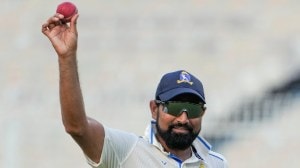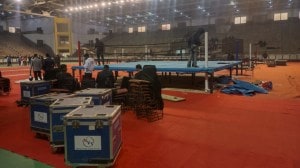I will quit but no compromises with team8217;s interests8217;
Q: What made you take up this assignment?A: Initially, when I was made the offer, I was a bit unsure. I also knew it's a hot seat, given ...

Q: What made you take up this assignment?
A: Initially, when I was made the offer, I was a bit unsure. I also knew it8217;s a hot seat, given the kind of pressures that come with the job. I thought long and deep, and finally decided I should give something back to the game that had given me so much.
Q: Before taking up the job, you had said that for a coach8217;s tenure to be effective, he should have far more powers than what he has at present: Voting rights in selecting the team, getting involved with domestic cricket, a say in finalising the international calendar8230;.
A: I don8217;t think having a voting right is that important. What is important is that the selectors, the captain and the cricket manager are clear about their goal. There should be a bonding between them8230;they should think along the same lines. My job is to convince the selectors why I want player A in the team and not player B. Similarly, if the captain does not have faith in a particular player8217;s ability and wants someone elsein his place, he should be able to convince everyone why he thinks so. After all, the end aim is to select the best possible combination. More than having a vote, what matters is that you should have faith in your judgment and the ability to convince your colleagues.
Q: What about domestic cricket?
A: If I am the coach of the team, I would definitely like to see those playing domestic cricket in action, otherwise how would I be able to judge a player? I had not seen Kumaran bowl but had faith in the selectors when they spoke highly of him. I would also like to see the Challenger trophy concept getting top priority. It is very important that the best talent in the country play each other. That is the only way to discover and encourage talent.
Q: Do you have the time to watch domestic cricket? Do the top players have the time to play in it, as the international calendar is so crowded?
A: I will have to find the time. I am very clear about one thing: that the quality of cricket is moreimportant than quantity. And for that we will have to reduce the number of one-day matches we are playing at the moment.
Q: Will the Board listen to you?
A: We will have to honour all the present commitments of the Board. But I would like the coach and the captain to be consulted on the scheduling of the new series and matches. We have to plan our international calendar better. It is very important for us that we play more Test matches and less one-dayers.
Q: But the Board8217;s attitude has been difficult. You have just begun your career as a coach and have already had a couple of brushes with the Board secretary, that too on such trivial issues as inviting a bowler to the nets or sending an injured Ajay Jadeja to South Africa. How do you then hope that they will consult you on important issues, like chalking out the calendar?
A: Frankly, at the moment I am a bit confused. Who is the real Board secretary? One day the secretary says one thing and the next day he says something else. Iam not fully aware how this Board functions, though today I am part of the administration of the game. I think the players, the coach, the captain and the Board should work in unison. I believe the Board should have a media coordinator, a professional man to talk to the media.
Q: Aren8217;t the signals confusing? It seems they are not listening to you? If their approach does not change, what will you do?
A: I think these are teething problems. I am not going to compromise where the interest of the team is concerned. I will quit my job but not compromise. For me, the team, the players8217; problems and how to sort them out come first.
Q: The Board secretary said he would take action against you when you invited Ajit Agarkar for the nets in Ahmedabad8230;
A: You don8217;t talk of taking action against a man whom you have requested to become the coach. You can only sit across the table and sort out the problem. I8217;m not a schoolboy, nor is my team a bunch of schoolboys. I was amused by the wordaction8217;. But as I said before, I hope these are teething problems and nothing more.
Q: Let8217;s talk of the series against New Zealand. Why were we so defensive?
A: I think it will take time to change our attitude. It can8217;t be done overnight. But look on the positive side: When has our team been shot out for 83 in the first innings and then recovered to be in a position to even win the match?
Q: Yet we squandered that opportunity. And why didn8217;t we enforce a follow-on and try to win at Ahmedabad? Don8217;t you think that was a negative approach?
A: There are two ways to look at it. Our bowlers had bowled 140 overs, and the three key bowlers almost 40 overs each. They also had bowled for three days and there was this fear of breakdown. They were tired, we wanted them to regain their breath. Also, the wicket was very good and to expect your bowlers at half strength to have a go at the rival team could even turn out to be counter-productive. We did not want to risk injury to ourbowlers.
Q: Is this something to do with too much cricket, again?
A: Well, frankly it has to do with the imbalance in our scheduling of one-day and Test matches. The boys hardly play Test matches. They are not used to bowling 30-40 overs a day. In one-day cricket you bowl only 10 overs a day. That is why I say it is very important to correct this imbalance.
Q: Is that why you needed to rest your key bowlers? But don8217;t you think some of them could resent this step as they tend to lose out on huge sums of money the fee for one match is Rs one lakh.
A: The players know what is good for the team and what is good for them. But it is necessary to take the consent of the player, to convince him of the reasons behind the decision.
Q: You are now three Tests and five one-day internationals-old as a coach. How do you assess this team and what needs to be done to make them match-winners?
A: I think this team has more talent than the ones I used to play in. But talent alone cannothelp you win matches. What needs to be done is:
a Develop Self-Belief: Believe you can achieve. My job is to drill into them that they have the talent to compete against and beat the best. Make them work extra hard with a smile, try to improve at each step but without losing the sense of enjoyment.
b Discipline: They have to learn what8217;s good for them and what8217;s bad. You can8217;t enforce discipline. I like to be strict but not move around with a stick in my hand. They are like my younger brothers. I was a disciplined cricketer and know the value of discipline. They need to be committed and commitment cannot be forced on anyone.
Q: What about fitness?
A: That, of course, is the key problem. One has to be fit before one enters the international arena. Fitness can8217;t be acquired at that late a stage. Training has begin at a young age at schools, from the under-16, under-19 level. Since most of our cricketers have not taken much workload at that age, our team is not of internationalstandard as far as fitness goes.
Q: But something needs to be done with the national team.
A: Well, I and physio Andrew Leipus, are working at it. It has to be done step by step. We have to also be prepared to face the risk of injury to a few players while trying to improve their fitness. The injuries to Ramesh and Jadeja were due to this reason alone both have shoulder problems. Our players have weak shoulders due to which they can8217;t throw flat from the deep. We are trying to improve on this aspect.
But for long-term planning, I also think that apart from a stress on fitness at the junior level, the Board should recognise the academies being run by former players and make uniform guidelines for fitness and coaching for them to follow.
Q:Kapil, after Tendulkar, you are the biggest star in the team, in terms of popularity, fan following and product endorsements on TV. Don8217;t you think this puts too much pressure on your time as well?
A: First of all, let me make it clearthat I am no star. Once I decided to take up this assignment, I knew I have to make some sacrifices. I have made it clear that no player is going to indulge in any non-cricketing activity during match days and that applies to me as well.
Q: There is also talk of a strong possibility of a clash between the two superstars of Indian cricket: you and Tendulkar.
A: Look, I am no superstar and I have no ego. He is the captain of the team. He has a job to do and so have I. It has to be done by both of us together. My job as a coach/manager is to build a team which people can remember. I have to look after the team, which includes the captain as well: their needs both on and off the field. My job is to develop a strong bonding between all the team members. They should feel they are members of one strong family. I think in this, the media too must help out. The press should realise that they are writing about the national team and should not do stories that disturb the harmony of the team.
Q: Well,the media has a job to do 8212; tell people what is happening. How can it stop doing that?
A: I am not against writing news based on facts. I feel these days thee media is under tremendous pressure 8212; due to competition or whatever 8212; because of which it sometimes writes stories which are exaggerated and have little basis on facts. I am against that. By all means write news, but not gossip.
Q: Let us talk about the Australian tour. People have already written off this Indian team. What is your assessment?
A: I don8217;t care what people are saying. It is a tough tour and we are going with a very positive attitude to win and not to lose.
Q: There is this perception that Mohammed Azharuddin has been left out of the team because he did not get along well with you and Tendulkar?
A: At the moment, I am not involved in the selection. I am still watching, learning and absorbing. People have a right to their opinions. But I do believe that we should not talk about Azharuddin8217;s cricket. Hehas been a great player for us, done so well for the country. We either take him or not, but let8217;s stop assessing him as a player. As far as his dropping is concerned, let the chairman of the selection committee explain this.
Q: What do you think is the future of Indian cricket with you as its coach?
A: I have a lot of things to do, but one thing I promise: My stress will be on quality and not quantity.
INSIGHT:
On his relationship with Sachin
Look, I am no superstar and I have no ego. He is the captain of the team. He has a job to do and so have I. My job as a coach is to build a team which people can remember. I have to look after the team, which includes the captain.
On Azhar8217;s omission
At the moment, I am not involved in the selection. People have a right to their opinions. But I do believe that we should not talk about Azharuddin8217;s cricket. He has been a great player for us, done so well for the country. We either take him or not, but let8217;s stop assessinghim as a player. As far as his dropping is concerned, let the chairman of the selection committee explain this.
On Lele amp; BCCI8217;s functioning
Frankly at the moment I am a bit confused. Who is the real Board secretary? One day the secretary says one thing and the next day he says something else. You don8217;t take action against a man whom you have requested to become the coach.
- 01
- 02
- 03
- 04
- 05






























